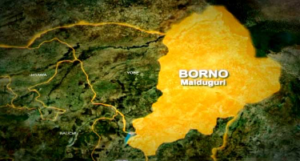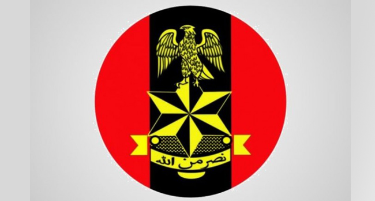In a significant victory against the insurgency plaguing Nigeria’s northeastern region, the troops of the Multinational Joint Task Force (MNJTF), operating under Sector 3, have apprehended a high-ranking Boko Haram logistics courier, Garba Buda, in Guzamala, Borno State. This arrest is being hailed as a major breakthrough in the ongoing efforts to disrupt the logistics network of the terrorist group.
Garba Buda, a 30-year-old suspect, had long been on the MNJTF’s most-wanted list. He was instrumental in supplying logistics, including critical supplies and provisions, to the terrorist group, enabling Boko Haram to maintain its activities in the Lake Chad region. His arrest marks a significant blow to the group’s operational capabilities, particularly in an area where they have remained deeply entrenched for years.
The arrest followed a carefully coordinated intelligence operation, which included both surveillance and human intelligence. After months of monitoring and gathering information on his movements and activities, MNJTF troops intercepted Buda while he was in transit through Monguno town. This was a critical point in his operations, as it disrupted a key supply chain that Boko Haram relies on to sustain their operations in the region.
 The successful capture of Buda highlights the effectiveness of intelligence-led operations in counterinsurgency efforts. The ability to gather and act on information swiftly is a vital component in the fight against terrorism, especially when dealing with a group that operates in the shadows. By cutting off their supply lines, the MNJTF is choking Boko Haram’s capacity to continue its destructive campaign.
The successful capture of Buda highlights the effectiveness of intelligence-led operations in counterinsurgency efforts. The ability to gather and act on information swiftly is a vital component in the fight against terrorism, especially when dealing with a group that operates in the shadows. By cutting off their supply lines, the MNJTF is choking Boko Haram’s capacity to continue its destructive campaign.
During the arrest, several personal items were recovered from the suspect, including a lighter, pocket mirror, comb, cap, and wristwatch. While these items may seem insignificant at first glance, they provide insight into the suspect’s movements and lifestyle. Such details, however small, can be useful in piecing together the broader logistics network that supports the insurgents. Intelligence officers will undoubtedly use these items as part of the broader investigation to uncover further connections to the terrorist group.
Garba Buda is currently in custody and is undergoing a thorough investigation. His capture has opened a window for security forces to delve deeper into the logistics network supporting Boko Haram. The investigation will aim to uncover further collaborators, routes, and methods used by the insurgents to smuggle supplies into their strongholds.
In a related development, MNJTF troops also launched a successful raid on a Boko Haram and ISWAP (Islamic State’s West Africa Province) stronghold in Kukawa Local Government Area, Borno State. The insurgents, likely tipped off about the advancing troops, fled the area, abandoning their logistical supplies. These supplies were subsequently destroyed by the troops, further crippling the operational capacity of the terrorists.
Operations like this not only disrupt the immediate logistics and planning of terrorist groups but also have a broader psychological impact. Seeing their supply lines severed and their strongholds raided sends a clear message to Boko Haram and ISWAP members that their movements are being closely monitored and that the military is closing in on them. For local communities living under the constant threat of violence from these groups, these operations bring much-needed relief and hope for a more secure future.
Lieutenant Colonel Olaniyi Osoba, the Chief Military Information Officer at the MNJTF Headquarters in N’Djamena, Chad, commended the troops for their unwavering commitment to the mission. He emphasized that these operations are part of a larger strategy to dismantle the terrorist networks that have terrorized the Lake Chad region for years. According to him, the MNJTF remains resolute in its mission to ensure the safety and security of local communities, particularly those living in the areas most affected by the insurgency.
The MNJTF, comprising troops from Nigeria, Chad, Cameroon, Niger, and Benin, has been at the forefront of regional efforts to combat Boko Haram and ISWAP. Since its establishment, the task force has made significant gains in weakening the operational capacity of these terrorist groups, reclaiming territories, and restoring security to affected communities. However, the fight is far from over. The fluid nature of insurgency, where terrorists can blend into civilian populations and operate in remote, difficult-to-reach areas, makes the task all the more challenging.
Nonetheless, the capture of Garba Buda and the successful raid on the Kukawa stronghold show that the MNJTF is making significant progress. These victories not only degrade the operational capabilities of Boko Haram and ISWAP but also inspire confidence among the local population that the military is capable of protecting them and restoring peace to the region.
The MNJTF’s efforts are part of a larger counterinsurgency strategy that includes military action, intelligence gathering, and community engagement. The goal is not only to defeat the terrorists militarily but also to address the underlying issues that fuel the insurgency, such as poverty, unemployment, and lack of education. By winning the hearts and minds of the local population, the MNJTF hopes to cut off the insurgents’ support base and bring lasting peace to the Lake Chad region.
As the investigation into Garba Buda’s activities continues, security forces will be looking to build on this momentum and carry out more operations aimed at dismantling the logistics networks that have sustained Boko Haram and ISWAP for so long. The road to peace in northeastern Nigeria and the Lake Chad region is long, but with continued dedication and collaboration, it is a goal that can be achieved.




